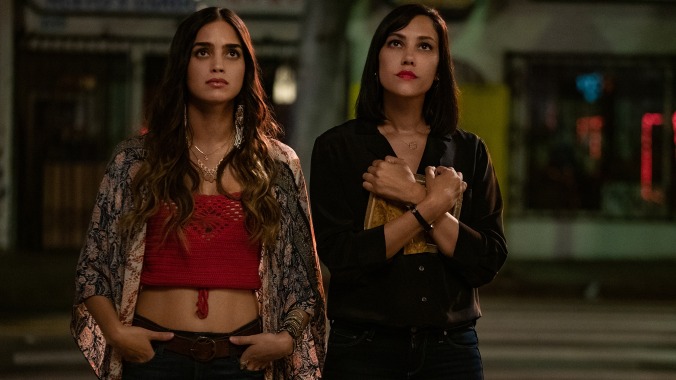Vida is smarter, sexier, and more vital in its 2nd season


Tanya Saracho’s Vida, one of The A.V. Club’s best shows of 2018, returns in stronger, sexier, and more spirited form in its second season. The Latinx-led dramedy about two estranged sisters trying to find their way home again—and all the difficulties they encounter in doing so—tells one of TV’s most nuanced stories about identity and immigration, but as its expansive title suggests, it contains so much more. Vida is an engaging family drama and an incisive coming-of-millennial-age comedy, with plenty of social commentary and a unique coming-out story at its core.
From its first moments, Vida has subverted expectations of most immigration/gentrification narratives, in part by focusing almost entirely on the Mexican and Mexican-American characters, who are positioned as natives as well as outsiders. The series follows protagonists Emma (Mishel Prada) and Lyn (Melissa Barrera) Hernandez as they cope with the recent loss of their mother, who took many secrets to her grave that are somehow still finding the light of day. It also explores how the Hernandez sisters can be the antagonists in the lives of their neighbors: Emma and Lyn’s plans to overhaul their mother’s bar would not only destroy one of the few places of refuge for immigrants and queer folks in the city, but they would also tip the balance in favor of the greedy, aesthetic-free real estate developers that longtime residents like Marisol (Chelsea Rendon) have been protesting against. After successfully straddling two worlds and cultures for much of their lives, Emma and Lyn return to their childhood home to find they’re not welcome—they’re called “whitinas,” putas, and worse, gente-fiers. Systemic forces like housing inequality aren’t ignored, but Vida sets up a confrontation where the winners and losers look like they could be family, which makes the stakes both greater and more intimate.
Vida’s poignant first season ended with Emma and Lyn deciding to reinvest in their mother’s bar and their relationship with each other. Geography hasn’t been the only source of distance between the sisters—they also have distinct, frequently opposing personalities. Lyn is overly expressive with little direction beyond a calendar of outdoor music festivals, while the career-minded Emma is emotionally closed-off. The vibrant, jam-packed first season revealed how their different upbringings sent them on diverging paths: younger daughter Lyn was coddled at home, but the queer Emma (who actually declines to self-define) was sent to Chicago by their at-the-time homophobic mother, who later turned her bar into a beacon for LGBTQ folks. Emma is much more conflicted about their mother’s death, especially once she learns Vidalia was running her queer-friendly bar with her wife, Eddy (Ser Anzoategui). But after realizing what the bar’s real legacy is, Emma and Lyn commit to preserving its standing as a safe haven in the community.








































